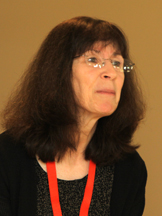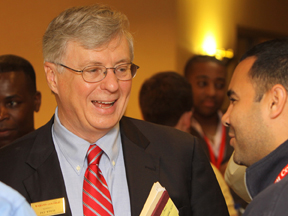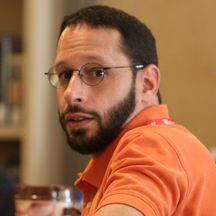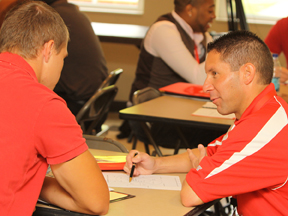The alumni who returned to campus Saturday to participate in a workshop that formally launched two alumni-student mentoring programs were almost universal in their response: “It’s about time.”
The alumni have volunteered to serve as mentors to students enrolled in the Generation to Generation (G2G) and Malcolm X Institute alumni-student mentoring programs. Saturday’s workshop, facilitated by Cornell University’s Candace Chow, brought the alumni and students together for a series of exercises and activities designed to help them get to know one another.
The programs target students who are the first members of their families to attend college, as well as students of color. The students were matched with alumni who were first generation college graduates.
The goals are to improve retention of the students, help them to become more engaged with their faculty and coursework, and to graduate on schedule.
Data from the
Wabash National Study of Liberal Arts Education and other sources indicates that students of color and students who are among the first members of their families to attend college have higher attrition rates than the rest of the student body.
“You alumni are a big part of our effort to work sooner, earlier with our freshmen so that they can succeed here,” said Associate Dean Cheryl Hughes, who is coordinating the
CIC/Walmart College Success Awards grant, which provides funding for a number of the programs' activities.
One of the central issues the alumni talked about from their own experiences was falling behind, then trying to catch up in class while battling the natural challenges of transitioning to college life.
Caleb Ishman ’03, who is a teacher and coach at 21st Century College Prep Academy, said the biggest hurdle for many freshmen is pride.
“At a place where pride is currency, how can we persuade these young men to seek help when they need it,” Ishman asked.

Julia Rosenberg, who directs the College’s
Academic Support Services, said that pride continues to be one of the biggest issues she faces.
“We have fabulous programs… but it is an issue,” she said. “The students come in here, they’re 18, starting a new life, and they are proud. They say, ‘I’m going to do it by myself.’”
Rosenberg said that Wabash fosters a very strong peer-help environment, meaning many of the students who show up seeking help with their writing, study skills, or tutoring in math and science come because a friend suggested it was a good idea.
“Some professors require their freshman students to visit the Center just to get their foot in the door,” said Rosenberg. “Anything you as alumni can do to convince these students that it’s acceptable to seek help would be beneficial.”
Saturday’s program featured separate orientation sessions for the students, remarks from President Pat White, and quick introductions to career services, counseling, and academic support services.

“Everyone in the world knows Wabash has great alumni, but your presence here today suggests to me that you’re willing to take on the role of mentor and educator for our students,” said President White.
“We’re asking you to take on an important and life-transforming role for yourself and for our students. All of us at Wabash are enormously grateful to you.”
Alumnus Keith Nelson ’71, who was one of the founders of the Malcolm X Institute, said he felt independent students were at higher risk to fall behind because fraternities often have scholarship chairs that monitor the progress of freshmen.
“Are there programs specifically directed at independent students who often don’t have access to peer tutors [in the same way as students in fraternities],” Nelson asked. “Is there recognition of two different cultures in terms of outreach?”
Rosenberg said that the culture at Wabash has changed in recent years and that Associate Dean Will Oprisko works hard with residence hall advisors in training programs so that they can provide skilled support for students. Dean Hughes also added that the Independent Men’s Association is a much more active organization.
“We know that men come in here very confident,” Rosenberg added. “They may remain confident on the outside, but they are facing challenges on the inside. They don’t always share these feelings, so it’s our job to let them know that lots of students are feeling exactly the same way.”

Anthony Hart ’87 was quick to respond when asked to serve as a mentor, and he was pleased to see so many other alumni answer the call.
“Sometimes, I think it is important for the students to hear that some of their ‘issues’ are not as ‘new’ as they thought and seem to cycle around over and over — that other people have gone through similar trials and emerged successfully,” Hart said.
Chow, who is assistant director of Cornell’s alumni-student mentoring program, reminded the alumni that building relationships with students takes effort and patience.
“Think about how uncomfortable it was for you as freshmen to approach and speak to adults,” she said. “For many students, that’s a very difficult thing to do. So, if you find yourself always reaching out to the students and they aren’t coming to you, keep in mind that they are 18, 19 years old and are trying to figure it out on their own.”
Chow also facilitated some activities that allowed students and alumni to conduct personal assessments and to get acquainted beyond a handshake.
“The most critical aspect of our work together is being able to form a trusting relationship in a very short amount of time,” she said.
Judging by the richness of the conversations among alumni mentors and the students with whom they had been paired, the program is off to a great start.

 Julia Rosenberg, who directs the College’s Academic Support Services, said that pride continues to be one of the biggest issues she faces.
Julia Rosenberg, who directs the College’s Academic Support Services, said that pride continues to be one of the biggest issues she faces. “Everyone in the world knows Wabash has great alumni, but your presence here today suggests to me that you’re willing to take on the role of mentor and educator for our students,” said President White.
“Everyone in the world knows Wabash has great alumni, but your presence here today suggests to me that you’re willing to take on the role of mentor and educator for our students,” said President White. Anthony Hart ’87 was quick to respond when asked to serve as a mentor, and he was pleased to see so many other alumni answer the call.
Anthony Hart ’87 was quick to respond when asked to serve as a mentor, and he was pleased to see so many other alumni answer the call.